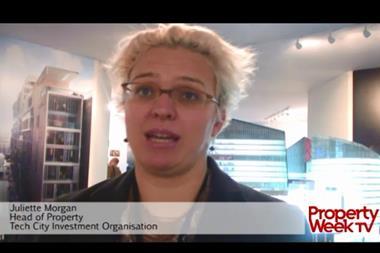Our panel of experts plot their way through the investment landscape, discussing where money is coming from, where it is going, and emerging trends.

Download the full print version >>>
Introduction
The Property Week round table produced a wide range of views about many different areas of the market. The overall sentiment seems to be that the markets are improving slowly and gradually, but that there remains a marked differential between London and the rest of the UK. There are also wide discrepancies in the global markets — for example, unlike Europe, Canada has been hardly affected by long years of recession.
Undoubtedly there continues to be a huge wave of money anxious to invest in London, which is seen as a safe haven. Security of income has become the paramount priority, rather than achieving high levels of return. Occupier demand remains high in London with new businesses such as the TMT (technology, media and telecoms) sector moving in. This drive towards secure annuity income has meant that there are some signs that less strong covenants are now also being considered, although there is little evidence that there is any real fundamental shift in this direction. Some of our panellists have also been buying industrial assets, which they see as a good cashflow business.
One of the major issues overall is the shortage of stock. At the start of the calendar year, there was a strong anticipation that there would be far more stock available, with the banks playing their part in offloading many of their assets onto the market. But this has certainly not been the case and the banks’ reluctance to sell at any price has remained a key driver for the lack of volume in the investment market.
On the other hand, there are signs that debt is becoming increasingly more available — both from funds that are looking to get into the market and also from the banks. The terms upon which this finance will be available should become more favourable as the year goes on. Low interest rates also look likely to stay for the next five years, which will have an impact on all strategies.
In terms of looking overseas, foreign capital remains focused on core. After London it is looking at Germany. The biggest investors have been the US funds but the Japanese are now back and other Asian investors are now showing interest — but they want core real estate.
In looking to deal with global income, there appears to be some tension between the degree to which investors are prepared to allow managers discretion to invest on their behalf and the control that they wish to exert on them. With the recent difficulties and losses of some funds fresh in their minds, this is understandable. But it does strangle deals. If managers do not have sufficient discretion they are often not able to take advantage of the opportunities that present themselves, a situation exacerbated in illiquid markets.
Lack of stock is driving investors, including several funds, to look at alternative areas of investment in the real estate markets, not just offices and retail. Residential, social housing, student accommodation and healthcare are now in vogue. This trend looks as though it will continue to develop over the next period. However, our discussion illustrates that in respect of institutional investment into residential, there are still a wide variety of views over how best to develop this as an asset class in real estate.
On the whole, our panellists feel sentiment is improving, with the caveat that the general economic and political climate must remain settled for the market to continue its slow path to recovery.
Jon Vivian, head of real estate, Irwin Mitchell

Our panel of experts
“We’ve been looking outside the capital at institutional-type assets. We think that as international capital gets hungrier for London, there will be a shift of UK institutions into the regions”
Cameron Spry, partner, head of investments, Tristan Capital Partners
“Alternatives will be a growing trend. In the first half of the year, around £2bn of the £8bn of deals were in this sector. The state of the IPD index in five years’ time will be very different”
William Hill, head of property, Schroders
Mike Brown, CEO, Prestbury Investments
Jessica Hardman, head of transactions - UK and Ireland, Deutsche Asset & Wealth Management
Alastair Hilton, head of investment, Farebrother
Bill Hughes, managing director, Legal & General Property
Jonathan Hull, managing director, CBRE EMEA Capital Markets
Giles King, head of investor services, EMEA, CBRE Global Investors
Rob Thompson, real estate partner, Irwin Mitchell
Jon Vivian, head of real estate, Irwin Mitchell
Monika Ward, deputy head of research and strategy, Axa Real Estate
Mike Phillips, acting editor and chair, Property Week
In association with:




























No comments yet